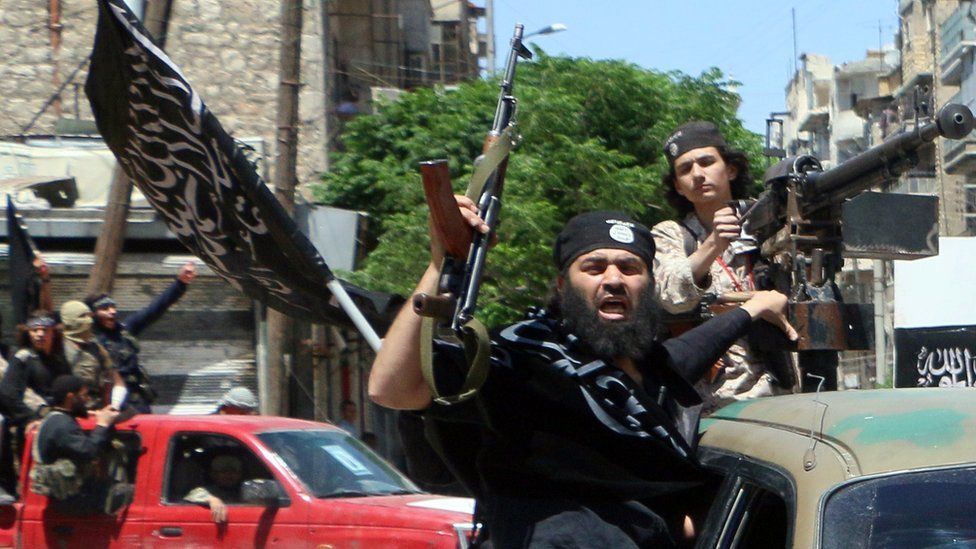Syria war: Who are Jabhat Fateh al-Sham?
- Published

The Syria-based jihadist group al-Nusra Front changed its name to Jabhat Fateh al-Sham (Front for the Conquest of Syria/the Levant) at the end of July 2016, reportedly cutting ties with al-Qaeda at the same time.
It is thought that the public severing of links with al-Qaeda may not be as total as portrayed, and could be a means for the group to become involved in the political process in Syria, where it is fighting forces loyal to President Bashar al-Assad.
Led since its formation by Abu Mohammed al-Jawlani, Jabhat Fateh al-Sham (formerly known as Nusra Front) long tried to forge a broad alliance with other Syrian Islamist rebel groups, but its efforts had been hampered by its overt al-Qaeda links.
The former Nusra Front was excluded from taking part in on-off US- and Russia-sponsored Syrian peace talks in Geneva and Vienna.
Baghdadi's creation
The former Nusra front was formed at the end of 2011, the result of al-Qaeda in Iraq's leader (and now leader of so-called Islamic State (IS)) Abu Bakr al-Baghdadi ordering Abu Mohammed al-Jawlani to organise jihadist groups in the region.
It became prominent thanks to reliable funding, weapons supply and fighters who were well-trained for the battlefield.
The group said at the time of its emergence that it had been responsible for a number of suicide bombings in the early days of the conflict. These included attacks on civilian targets which lost them public support for some time.
When al-Baghdadi announced that the group was to become part of the then-Islamic State in Iraq (ISI), Nusra Front refused to pledge allegiance, continuing to affiliate itself with al-Qaeda instead.
That refusal led to clashes between the groups, which resulted in Nusra losing its base in Deir al-Zour in the east of Syria, along with oil fields which provided the Front with significant income.
Power base
No longer influential in territories lost in its bloody dispute with IS, Jabhat Fateh al-Sham remains dominant in Idlib in the north-west of Syria.
By the summer of 2015, the Nusra Front controlled most of Idlib province, including the capital, establishing Sharia courts and taking over government services.
The group also has strongholds in neighbouring Aleppo, which has witnessed scenes of heavy fighting against troops loyal to President Assad, as well as coming under air attacks from foreign forces.
Nusra's relationships with other militant groups have been fluid. It maintains contacts with non-IS groups, and often works with powerful jihadist group Ahrar al-Sham. The two groups were key to taking over Idlib from the Syrian government.
Jabhat Fateh al-Sham has a complex relationship with the more moderate Free Syrian Army (FSA), which is itself an alliance of allied groups, some of which were more willing to co-operate with Nusra than others.
Despite differing ideologies, Jabhat Fateh al-Sham and the FSA have the shared goal of overthrowing President Assad and have fought together against both government and IS forces.
Their differences, including plans for the future of Syria, have led to defections between groups, kidnappings and military confrontations.
Air strikes
The vast majority of Jabhat Fateh al-Sham's 5,000-10,000 fighters are Syrian, and it has not become a magnet for foreign jihadists in the same way that Islamic State has.
However, the group still causes alarm among Western and Arab governments due to its extremism and history of links with al-Qaeda.
Despite this, it is seen as a "least worst" alternative when faced with an uncompromising "Islamic State" in the Syrian conflict, but its al-Qaeda allegiance made it impossible to justify state-level contacts.
It has been claimed that Qatar has relatively close ties with the group through intermediaries, in an effort to make them more palatable, a charge that the government in Doha strongly denies.
In early 2015, UN special envoy to Syria Staffan de Mistura said that he would speak to anyone, including the Nusra Front, in an effort to save lives.
Nonetheless, the Front was involved in a number of high-profile hostage-taking incidents, including the kidnap of 45 Fijian peacekeepers, who were subsequently released.
The United States designated the Nusra Front a terrorist organisation in November 2012, and has says that it has no plans to reassess this status in the wake of its name change.
Its existence at the al-Qaeda end of the spectrum of groups operating in Syria means that Jabhat Fateh al-Sham has been a target for air strikes by both Russian and US-backed military action.
Excluded from February 2016's "cessation of hostilities" agreement, it is thought that the name change, distancing itself from al-Qaeda, and reaching out to other militant groups is an attempt to bolster its influence while under increasing military pressure.
'Overthrow Assad'
The July 2016 name change came about following a message posted on the Telegram messaging app by al-Qaeda's second-in command Ahmed Hassan Abu al-Khayr.
He called on the group to abandon its links with al-Qaeda and forge relationships with other Syrian jihadist factions to form a Sunni Islamist government.
A subsequent televised address by leader Abu Mohammed al-Jawlani confirmed the renaming, saying the group will have "no links whatsoever with foreign parties".
Declaring that the newly-named Jabhat Fateh al-Sham would now work to form "a unified body" which would "liberate the Syrian people", he said that its major aim was still to rid the country of "evil tyrant" Bashar al-Assad and his government.
BBC Monitoring reports and analyses news from TV, radio, web and print media around the world. You can follow BBC Monitoring on Twitter and Facebook.